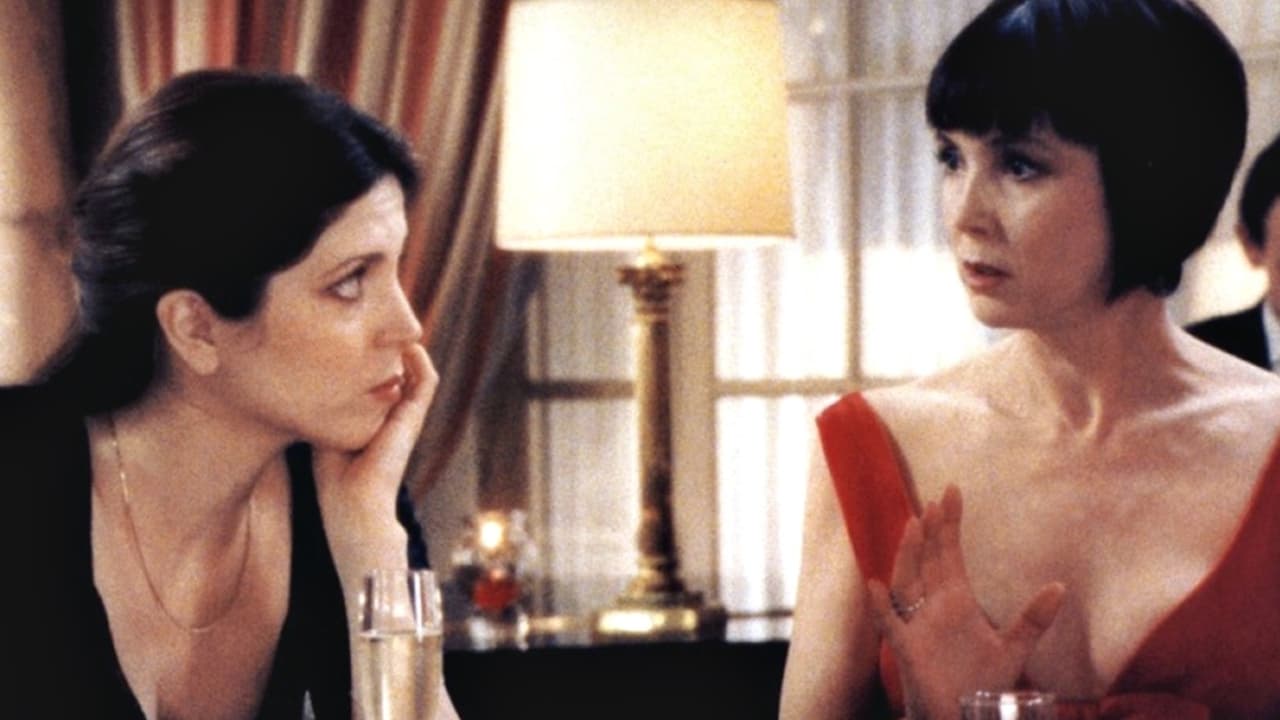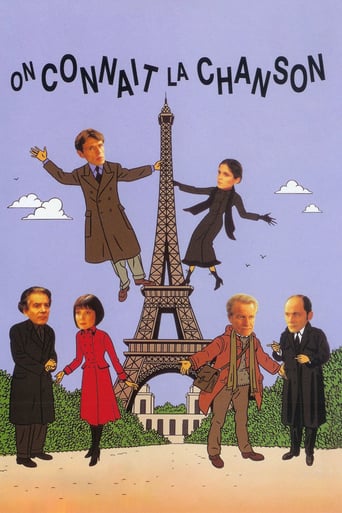

Nice effects though.
... View MoreAmateur movie with Big budget
... View MoreAfter playing with our expectations, this turns out to be a very different sort of film.
... View MoreIt really made me laugh, but for some moments I was tearing up because I could relate so much.
... View More*********** SPOILERs GALORE***************** so read at your own peril,but by now I hope anybody who reads these comments know the film already, and are here to find out more about the film, eh?We all float.......... don't we, in life? And we all wish we could sing as well as them singers do! And in tune! In a way, this is like a "Karaoke" movie to express how we feel inside using the tunes that suit the moment and acting it out, too. At least, that's what I kept thinking, instead of thinking that this film is purely a tribute to Potter and all the classic chansons.But it's undoubtedly a masterpiece. To weave the story so well with the tunes is a remarkable achievement, the writers who also acted in the film know their material very well! C'est la vie indeed, as good things turn bad and bad things turn good and what was unknown is all of a sudden discovered and passed on and misunderstandings are cleared up.Yes we all love Paris, and that view is vital, it's a metaphor for how things must be seen to be understood, how that heavenly site is exactly why the imagination stir the soul and love blossoms in that city. It is the clarity that cannot be and shall not be blocked, and for those who try to subvert that clarity will be exposed and punished.....! And then there are those who simply shrug and say that such is life and we move on, Paris will always be Paris, with its hysterics controlling the sights and the rest swimming through it without actually affecting anything.Ahhhhhhhh............ j'aime Paris, aussi.
... View MoreIn the unapproximate center of "On connaît la chanson," find a marvelous joke that missed by everyone at the sold out SFIFF screening I attended. If you want to try to catch it yourself, then don't read on! I'm writing to those of you who didn't or won't catch it. Four or five characters are seated chatting or arguing, I forget, round a table in a busy restaurant. As you know from other comments here, the script incorporates line fragments from well-known French songs (kind of like those "hidden picture" puzzles in the dentist office magazine). As each occurs, someone bursts into song. One of our group, after an unremarkable, perfectly conversational pause, says "je ne regret rien," then pauses, as does everyone else round the table. They look at one another, everyone at everyone, the very clatter of the restaurant seems to pause, waiting, and for the only time in this film, nobody takes the cue. Nobody breaks into the Piaf standard.
... View MoreThis film is light, but not empty. Following the interconnected lives of several Parisian bourgeois, the film uses snippets of popular music to demonstrate the emotional state of the characters in the style of a conventional musical. However, the music does both more than this and less. The characters do not sing their parts so much as lip-sync (badly) to tunes that one hears on the radio or in a movie. The songs are related to the characters' "inner lives" as a Nike swoosh or a Dior label would be - and that's the point. Each character has a musical style of sorts and maybe even a theme song, but the song "belongs" to the character like motion "belongs" to a jelly-fish. The characters, like the jelly-fish that are a motif of the finale scene, are less than unique, and much less than in control. However, they are at the same time quite human and sympathetic.Resnais, whom I count as being one of cinema's great geniuses, has a similar approach in On connaît la chanson as he does in Mon oncle d'Amérique, with pop songs in lieu of mice and jelly-fish in lieu of Henri Laborit. (See the info on the latter movie if this doesn't make sense...) What both films do is make one think about important questions of the complex relationship between brains, minds, and souls, and they do so without clobbering the viewer over the head with preachiness and over-simplifications. Contrast this with the sermonizing of the abominable Lars von Trier (of Dancer in the Dark fame) as well as with the mindless drek that that is generally shown in U.S. theaters.
... View MoreReminiscent of Jacques Demy's 1968 "The Young Girls of Rochefort" where characters now and then burst into song (and dance) to convey the story, and Eric Rohmer's flavor of intertwined relationships and coincidental meetings of characters that wrap around a tale, Alain Resnais' treatment here in 1997 "Same Old Song" has his characters burst into lines of songs in between dialogs. Irrespective of the mix and match of a male vocal coming out of a female character or vice versa, they are excerpted strains and words chosen from certain songs that propel the storytelling. It's as if the characters are thinking aloud in songs on the situation or predicament at hand. It is rather fun once you get a sense of what Resnais was trying to deliver. Being an Alain Resnais film, intellectual exchanges and philosophical tones are never lacking.Definitely reminded me of his treatment on 1980 "Mon oncle d'Amerique" where he has scientific mice experiment scenes juxtaposed against the human (brain) reactions to relationships and love. In this 1997 "On connait la chanson", his fascination with how people think - how the brain cells work in each of the characters, is again deftly demonstrated. At the last segment, where a theoretical explosion of the minds occur as gray matters collide - there was an appearance of a graphical ear-shape (in quiet wavy motion) in the center of it all - it's amazing to see how Resnais' mind at 75 was still so very much into studying and unraveling human emotions, offering us life lessons in love.The story centers around two sisters, Camille the tour guide who's also writing a thesis (Agnes Jaoui) and her popular and successful sibling Odile (Sobine Azema), and four men in their lives: an old flame of Odile - Nicolas (Jean-Pierre Bacri), husband of Odile - Claude (Pierre Arditi), writer of radio plays and quiet admirer of Camille - Simon (Andre Dussollier, more casually groomed than usual), and profiteering real-estate agent of Odile, fanciful beau of Camille and arrogant boss of Simon - Marc (Lambert Wilson). Typographically oriented, I can't help noticing the sequence of treatment to the credit roll at the end of the film: it started with a centrifugal look of the names of les chanteurs, followed by horizontal scroll from right to left of the main cast and crew, then a quick shooting upwards to facilitate the conventional bottom to top scroll of rest of the credits.It may not be a French film for just anybody, it certainly is delightful to experience. (An Artistic License and Merchant-Ivory Films production indeed!) The subtitles, translated by Ian Burley, were super: the lyrics actually rhyme in English, e.g., "resist", "exist", "egotist"!This film was dedicated to Dennis Potter, a cerebral genius he was. Check out his 1996 "Karaoke" (a multitude of colorfully complex characters) and "Cold Lazarus" (quite a sci-fi notion not completely implausible) - both centers around Albert Finney being the main character, and as always, a tour de force performance Finney delivered.
... View More